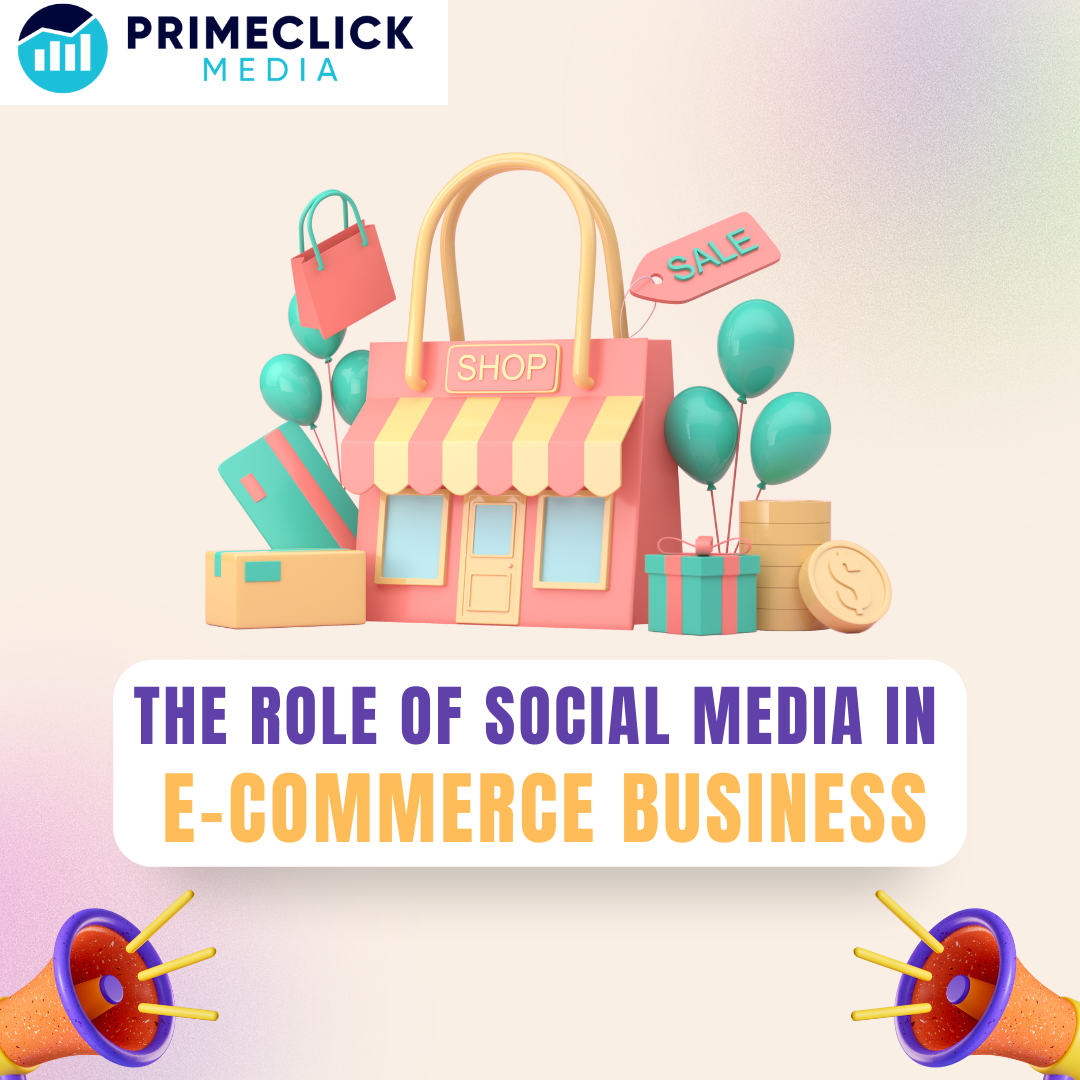Welcome to the world of social media, where virtual connections and real-time interactions have taken centre stage! Social media has become an integral part of our lives, influencing the way we communicate, share, and even shop.
In this blog, we’ll explore how social media is revolutionizing e-commerce marketing, reshaping the way businesses connect with their audiences, and driving remarkable growth in the digital marketplace.
Power of Social Media: Transforming E-commerce Marketing
Creating a Digital Shopping Experience
Social media platforms have evolved into vibrant marketplaces that cater to the needs of both consumers and businesses. From visually appealing product displays to interactive shopping features, these platforms offer a unique digital shopping experience. By leveraging the power of social media, e-commerce brands can reach a massive audience and showcase their products engagingly and interactively.
Building Brand Awareness
In the bustling world of e-commerce, standing out from the crowd is crucial. Social media acts as a catalyst for building brand awareness, allowing businesses to establish a strong online presence. With creative and consistent branding strategies, companies can forge meaningful connections with their followers, turning them into loyal customers and brand advocates.
The Rise of Influencer Marketing
Influencers have become the driving force behind many successful e-commerce campaigns. These social media personalities hold immense sway over their followers’ buying decisions, making them valuable partners for e-commerce brands. Collaborating with influencers helps businesses tap into new demographics, gain credibility, and drive conversions. It’s like word-of-mouth marketing on steroids!
Social Shopping: A Seamless Experience
Gone are the days when users had to leave their favorite social media platforms to make a purchase. Today, social shopping has become a seamless experience, with “Shop Now” buttons and in-app checkouts transforming the way consumers buy products. This integration not only simplifies the shopping process but also reduces cart abandonment rates, thereby boosting sales for e-commerce businesses.
Harnessing the Power of User-Generated Content
User-generated content (UGC) is a goldmine for e-commerce marketers. Social media users love to share their experiences with products, creating authentic content that resonates with their peers. Smart businesses harness this trend by reposting UGC, organizing user-generated contests, and using customer reviews to build trust. This dynamic engagement not only boosts brand loyalty but also drives conversions.
Personalization: A Game-Changer
Social media platforms collect vast amounts of user data, providing valuable insights into their interests, behaviors, and preferences. E-commerce brands can leverage this data to create highly personalized marketing campaigns. By targeting specific demographics with tailor-made content, businesses can enhance customer experience and boost their chances of making a sale.
Measuring Success with Analytics
Traditional marketing efforts often lacked accurate measurement tools, making it challenging to gauge success. Social media platforms, on the other hand, offer robust analytics that allows e-commerce marketers to track and analyze their campaign performance in real-time. This data-driven approach enables businesses to make data-backed decisions, refine their strategies, and optimize their marketing efforts for maximum impact.
Benefits of Social Media in E-commerce
Social media plays a pivotal role in e-commerce, offering numerous benefits that can significantly impact businesses’ success and growth. Here are some of the key advantages of using social media in e-commerce:
Expanded Reach and Audience Engagement
Social media platforms have billions of active users, presenting a vast potential audience for e-commerce businesses. By leveraging these platforms, businesses can reach and engage with a global audience, increasing their brand visibility and awareness.
Enhanced Brand Awareness and Recognition
Consistent and creative branding on social media helps businesses establish a strong online presence. Regularly interacting with followers and sharing valuable content builds brand recognition, making it easier for customers to identify and remember the brand.
Targeted Advertising and Cost-Effectiveness
Social media platforms provide sophisticated targeting options, enabling businesses to reach specific demographics, interests, behaviors, and locations. This level of precision ensures that marketing efforts are directed at the most relevant audience, maximizing the return on investment.
Real-Time Customer Interaction
Social media facilitates direct and instant communication between businesses and customers. This real-time interaction allows brands to respond to customer inquiries, address concerns, and build meaningful relationships, leading to increased trust and loyalty.
Influencer Marketing
Collaborating with influencers who have a significant following and influence on social media can amplify the reach of e-commerce businesses. Influencers can effectively promote products, share experiences, and drive sales through their authentic recommendations.
User-Generated Content and Social Proof
User-generated content (UGC) showcases real customers’ experiences with products or services. This form of social proof builds credibility and trust, encouraging potential customers to make purchases based on positive reviews and experiences shared by others.
Social Shopping and Impulse Buying
Social media platforms have integrated shopping features, allowing users to make purchases without leaving the app. This seamless social shopping experience reduces friction in the buying process and encourages impulse buying.
Data and Analytics
Social media platforms provide detailed analytics that helps e-commerce businesses measure the performance of their marketing efforts. By analyzing data such as engagement rates, click-through rates, and conversion metrics, businesses can fine-tune their strategies and improve overall performance.
Competition Monitoring and Market Research
Social media offers insights into competitors’ activities, allowing businesses to monitor their strategies and stay ahead in the market. Additionally, social media provides valuable data about consumer preferences, trends, and sentiments, aiding in market research and product development.
Customer Retention and Loyalty
Engaging with customers on social media fosters a sense of community and loyalty. Offering exclusive promotions, discounts, and rewards to social media followers can help retain existing customers and encourage repeat purchases.
Social Media Strategy for E-commerce
Creating an effective social media strategy is crucial for e-commerce businesses to leverage the power of these platforms and drive success. Here’s a step-by-step guide to building a winning social media strategy for your e-commerce venture:
- Set Clear Goals and Objectives: Start by defining your social media goals. These could include increasing brand awareness, driving website traffic, boosting sales, engaging with customers, or launching new products. Your goals will serve as a roadmap for your social media activities.
- Know Your Target Audience: Understand your target audience’s demographics, interests, behaviors, and pain points. This knowledge will help tailor your content and messaging to resonate with your ideal customers.
- Choose the Right Social Media Platforms: Not all social media platforms are suitable for every e-commerce business. Identify the platforms where your target audience is most active and focus your efforts on those channels. Common platforms include Facebook, Instagram, Twitter, Pinterest, and LinkedIn.
- Develop a Content Strategy: Plan a content calendar that outlines what content you’ll post and when. Mix up your content to include product showcases, educational posts, behind-the-scenes glimpses, user-generated content, and promotional offers.
- Emphasize Visuals: In e-commerce, visuals are everything. Invest in high-quality images and videos that showcase your products in the best light. Use eye-catching visuals to capture the attention of your audience as they scroll through their feeds.
- Leverage User-Generated Content (UGC): Encourage customers to share their experiences with your products through UGC. Repost and share this content to build trust and social proof.
- Engage with Your Audience: Social media is all about engagement. Respond promptly to comments, messages, and mentions. Create conversations, ask questions, and listen to feedback to foster a sense of community around your brand.
- Run Contests and Giveaways: Organize social media contests and giveaways to boost engagement and attract new followers. Offer attractive prizes that align with your products to encourage participation.
- Partner with Influencers: Collaborate with influencers who align with your brand and have a significant following in your niche. Influencers can help promote your products authentically to a wider audience.
- Monitor Analytics and Refine: Regularly analyze your social media performance using built-in analytics and third-party tools. Track key metrics such as engagement, click-through rates, conversions, and follower growth. Use this data to refine your strategy and optimize your efforts.
- Integrate Social Shopping: Explore the option of integrating social shopping features like “Shop Now” buttons and in-app checkout on platforms that support it. Make it easy for customers to make purchases directly from your social media profiles.
- Provide Excellent Customer Service: Social media is often a customer’s first point of contact with your brand. Ensure your customer service team is responsive and attentive to inquiries and issues raised on social media.
Conclusion
The role of social media in e-commerce marketing cannot be overstated. It has transformed the way businesses engage with their audiences, turning prospects into loyal customers and brand enthusiasts. With the power of social media at their fingertips, e-commerce brands can navigate the digital landscape with confidence, creativity, and data-driven precision.
So, whether you’re a business owner or an avid online shopper, embrace the ever-evolving world of social media and witness the magic it weaves in the realm of e-commerce marketing. Let’s embrace this digital revolution and embark on a journey of endless possibilities!





